A King’s Painting
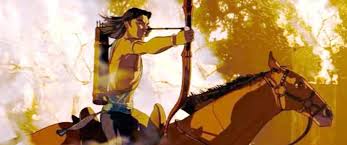
Once upon a time, there was a Kingdom. The king there only had one leg and one eye, but he was very intelligent and kind. Everyone in his kingdom lived a happy and a healthy life because of their king. One day the king was walking through the palace hallway and saw the portraits of his ancestors. He thought that one day his children will walk in the same hallway and remember all the ancestors through these portraits.
But, the king did not have his portrait painted. Due to his physical disabilities, he wasn’t sure how his painting would turn out. So he invited many famous painters from his and other kingdoms to the court. The king then announced that he wants a beautiful portrait made of himself to be placed in the palace. Any painter who can carry out this should come forward. He will be rewarded based on how the painting turns up.
All of the painters began to think that the king only has one leg and one eye. How can his picture be made very beautiful? It is not possible and if the picture does not turn out to look beautiful then the king will get angry and punish them. So one by one, all started to make excuses and politely declined to make a painting of the king.
But suddenly one painter raised his hand and said that I will make a very beautiful portrait of you which you will surely like. The king became happy hearing that and other painters got curious. The king gave him the permission and the painter started drawing the portrait. He then filled the drawing with paints. Finally, after taking a long time, he said that the portrait was ready!
All of the courtiers, other painters were curious and nervous thinking, How can the painter make the king’s portrait beautiful because the king is physically disabled? What if the king didn’t like the painting and gets angry? But when the painter presented the portrait, everyone in the court, including the king, left stunned.
The painter made a portrait in which the king was sitting on the horse, on the one-leg side, holding his bow and aiming the arrow with his one eye closed. The king was very pleased to see that the painter has made a beautiful portrait by cleverly hiding the king’s disabilities. The King gave him a great reward.
Moral: We should always think positive of others and ignore their deficiencies. We should learn to focus on the good things instead of trying to hide weaknesses. If we think and approach positively even in a negative situation, then we will be able to solve our problems more efficiently.
The King and Macaw Parrots

Once upon a time, there was a king who had gone to visit neighboring kingdoms. He was gifted a pair of baby Macaw Parrots by the king of the last kingdom where he was visiting. They were the most beautiful birds he had ever seen. So, upon returning to his kingdom, he called for a bird trainer and asked him to train macaw parrots.
The king also arranged a place in the palace garden for the parrots. He often looked at them from his palace window. As time passed, one day the trainer came to the palace and informed the king that though one of the parrots was flying majestically high in the sky, the other one was not moving from its branch since the day it had arrived.
Upon hearing this, the king summoned trainer and healers from the nearby kingdoms. They all tried their best, but couldn’t make the parrot fly! He even asked his courtiers to try to find a way to make the parrot fly but they all failed. The parrot was not moving from his branch at all. Finally, after trying everything, the king thought that maybe he needs someone who may be more familiar with natural habitat. He asked his courtier to get a farmer from the countryside and take him to the parrot to see if he can understand the problem with the parrot.
The next morning, the king was thrilled to see the parrot flying high above the palace gardens. He asked his servant to call that farmer to meet him. The servant quickly went and located the farmer, who came and stood before the king. The king asked him, “How did you make the parrot fly?”
With his hands folded with respect, the farmer said to the king, “It was very easy, your majesty. I simply cut the branch where the bird was sitting.”
Moral: We are all gifted with energy to find a success in our life, but fail to gather a courage which is required to reach heights of success and end up clinging to the things that are familiar to us. We need to free ourselves from our comfort zone to explore new opportunities and find a success beyond our capacity.
The Way God Helps

There was a small village by the river. Everyone lived happily and offered regular prayers at the village temple (Church). Once during the monsoon season, it rained heavily. The river started overflowing and flood entered the village. Everyone started to evacuate their homes and set out to go to the safe place.
One man ran to the temple (Church). He quickly went to the priest’s room and told him, “The flood water has entered into our homes and it is rising quickly. And water has also started to enter the temple. We must leave the village as in no time it will sink under the water! Everyone has set out to go to the safer place and you must come along”. The priest told the man, “I am not an atheist like you all and I have a full faith in God. I trust the God that he will come to save me. I will not leave the temple, You may go!” So, the man left.
Soon, the water level started to rise and reached the waist height. The priest climbed on the desk. After a few minutes, a man with the boat came to rescue the priest. He told the priest, “I was told by the villagers that you are still inside the temple, so I have come to rescue you, please climb on the boat”. But the priest again refused to leave giving him the same reason. So the boatman left.
The water kept rising and reached to the ceiling, so the priest climbed to the top of the temple. He kept praying to the God to save him. Soon the helicopter came, they dropped the rope ladder for the priest and asked him to climb on and get inside the helicopter so they can take him to the safer place. But the priest refused to leave by giving him the same reason again! So the helicopter left to search and help others.
At last, when the temple nearly submerged under the water, the priest kept his head up and started complaining, “Oh Lord, I worshiped you for all my life and kept my faith in you! Why didn’t you come to save me?!” The God appeared in front of him and with a smile, he said, “Oh mad man, I came to save you three times! I came running to you to ask you to leave for the safest place with other villages, I came with a Boat, I came with a Helicopter! What is my fault if you didn’t recognize me?!”
The priest realized his mistake and asked for forgiveness. He got his chance to go to the safe place one more time, which he accepted.
Moral: In life, opportunities come unknowingly without any recolonization. We fail to recognize it and keep complaining that life didn’t give us the opportunity to lead a successful life. Always take every chance you get to make a better life.
The Lazy Man and the God’s Plan
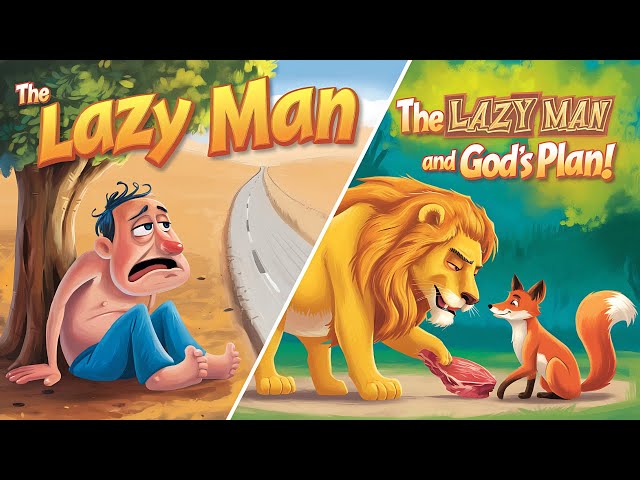
Once upon a time, there was a very lazy man who would always look for an easier way to feed himself. One day while he was searching for something to eat, he saw the fruit farm. He looked around and didn’t see anyone guarding the fruits on the tree, so he quickly decided to steal some fruits. But as soon as he walked into the farm and started to climb the tree, the farmer saw him and started coming at him to catch him. The lazy man saw the farmer coming at him with a stick, he got afraid and ran towards the forest nearby and went inside it to hide.
After some time when he felt he started to move on from the forest and while passing through, he saw the wonderful scene. There was a fox. It had only two legs and still was crawling on them happily. The lazy man thought, how can this fox stay alive in such condition?! The fox can’t run, how he must be able to feed himself or stay alive from the threat of other animals.
Suddenly, he saw the lion coming towards the fox with a piece of meat already in his mouth. All the animals ran away and the lazy man climbed up on the tree to save himself but, the fox stayed there only, he didn’t have the ability to run on two legs. But what happened next surprised the lazy man. The lion left a piece of meat which was in his mouth for the fox!
The lazy man felt happy seeing god’s play. He thought the god who is the creator of all, always has a plan set to take care of what he created. He felt that god must have something planned for him too. So, he left that place and sat somewhere away alone waiting for someone to feed him too. As time starting to pass, he kept looking at the road, waiting for his food. He waited there for 2 days without any food! Finally, he couldn’t bear the hunger and started to leave.
He met an old sage (a wise person famed for wisdom) on the way. He told everything happened to the sage. The sage first gave him some food and water. After having it, the lazy man asked the sage, “oh wise one, the god had shown his mercy on the crippled fox, but why the god was so cruel to me?”
The old sage with a smile said, “True that the creator has a plan for everyone. You are obviously a part of the god’s plan. But Son, You took his sign in a wrong way. He didn’t want you to be like the fox. He wanted you to be like the Lion”.
Moral: Often we misunderstand the signs. God has given everyone a strength and ability to do their part. Always learn to see the things in a positive way and see yourself in a strong position to help the ones who need. Don’t go for the easy choice. Make a right choice.
A Blank Question Paper
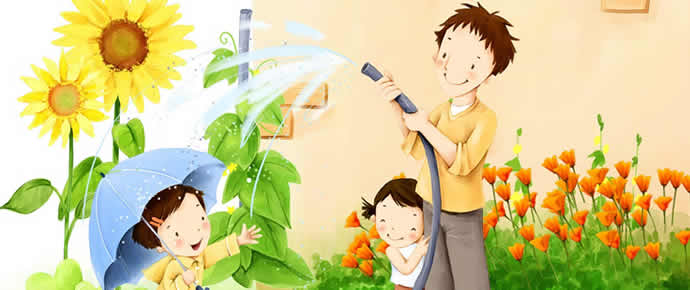
One day a professor entered the classroom and asked his students to prepare for a surprise test. They waited anxiously at their desks for the test to begin. The professor handed out the question paper with the text facing down as usual. Once he handed them all out, he asked his students to turn the page and begin. To everyone’s surprise, there were no questions, just a black dot in the center of the page.
The professor seeing the expression on everyone’s face, told them the following, “I want you to write what you see there.” The confused students got started on the inexplicable task. At the end of the class, the professor took all the answer papers and started reading each one of them aloud in front of all the students. All of them with no exceptions described the black dot, trying to explain its position in the middle of the sheet etc.
After all had been read, the classroom was silent. The professor began to explain, “I am not going to grade on you this, I just wanted to give you something to think about. No one wrote about the white part of the paper. Everyone focused on the black dot and the same happens in our lives. We have a white paper to observe and enjoy, but we always focus on the dark spots. Our life is a gift given to us by God with love and care. We always have reasons to celebrate, nature renewing itself every day, our friends around us, the job that provides our livelihood, the miracles we see every day.”
“However, we insist on focusing only on the dark spots, the health issues that bother us, the lack of money, the complicated relationship with a family member, the disappointment with a friends etc. The dark spots are very small compared to everything we have in our lives, but they are the ones that pollute our minds. Take your eyes away from the black spots in your life. Enjoy each one of your blessings, each moment that life gives you. Be happy and live a life positively!”
Moral: As the professor explained, life is a bag of good and bad things, we all have positives and negatives along the way. But we must always concentrate greater on the positives for a healthy and happy life. Life goes on no matter what so do not waste your time thinking about the negatives.
Mother’s Love for a Boy
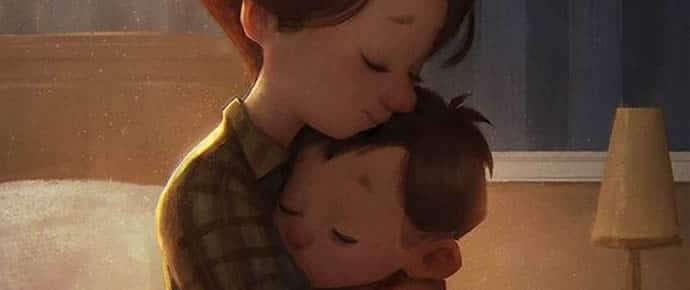
One day Thomas Edison came home and gave a paper to his mother. He told her, “My teacher gave this paper to me and told me to only give it to my mother.” His mother’s eyes were tearful as she read the letter out loud to her child, “Your son is a genius. This school is too small for him and doesn’t have enough good teachers for training him. Please teach him yourself.”
Many years after Edison’s mother had died, Edison had become one of the greatest inventors of the century. One day he was going through the old closet and he found a folded letter which was given to him by his teacher for his mother. He opened it. The message written on the letter was, “Your son is mentally ill. We can not let him attend our school anymore. He is expelled.”
Edison became emotional reading it and then he wrote in his diary, “Thomas Alva Edison was a mentally ill child whose mother turned him into the genius of the century.”
Moral: A Mother’s love and upbringing can help change the destiny of a child.
Lesson of Hastening the Judgement

A Father and his Daughter were playing in the park. His young daughter spotted an apple vendor. She asked her father to buy her an apple. Father didn’t bring much money with him, but it was enough to purchase two apple. So, he bought two apples and gave his daughter.
His daughter held one apple each in her two hands. Then a father asked her if she can share one apple with him. Upon hearing this, his daughter quickly took a bite from one apple. And before her father could speak, she also took a bite from the second apple.
A Father was surprised. He wondered what mistake he made raising her daughter that she acted in such a greedy way. His mind was lost in thoughts, that perhaps he is just thinking too much, his daughter is too young to understand about sharing and giving. A smile had disappeared from his face.
And suddenly his daughter with an apple in her one hand said, “Father have this one, this one is much juiciest and sweeter”. Her father was speechless. He felt bad about reaching to the judgement so quickly about a small child. But, his smile came back now knowing why his daughter quickly took a bite from each apple.
Moral: Don’t Judge anything too quickly or reach a conclusion. Always spare a time to understand things better.
The Travelers and The Plane Tree

Two men were walking along one summer day. Soon it became too hot to go any further and, seeing a large plane tree nearby, they threw themselves on the ground to rest in its shade.
Gazing up into the branches one man said to the other, “What a useless tree this is. It does not have fruit or nuts that we can eat and we cannot even use its wood for anything.”
“Don’t be so ungrateful,” rustled the tree in reply. “I am being extremely useful to you at this very moment, shielding you from the hot sun. And you call me a good-for-nothing!”
Moral: All of God’s creations have a good purpose. We should never belittle God’s blessings.
Boy’s Job Appraisal
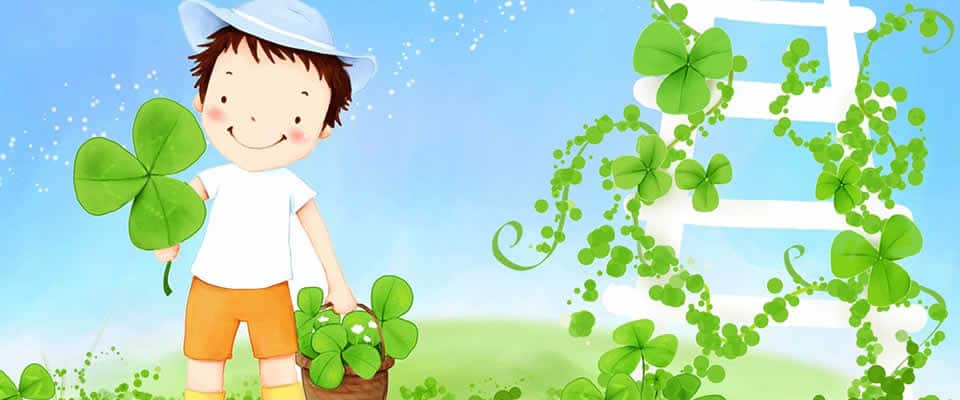
A little boy went into a drug store, reached for a soda carton and pulled it over to the telephone. He climbed onto the carton so that he could reach the buttons on the phone and proceeded to punch in seven digits (phone numbers). The store-owner observed and listened to the conversation.
Boy: ‘Lady, Can you give me the job of cutting your lawn?
Woman: (at the other end of the phone line): ‘I already have someone to cut my lawn.’
Boy: ‘Lady, I will cut your lawn for half the price of the person who cuts your lawn now.’
Woman: I’m very satisfied with the person who is presently cutting my lawn.
Boy: (with more perseverance): ‘Lady, I’ll even sweep your curb and your sidewalk, so on Sunday you will have the prettiest lawn in all of Palm beach, Florida.’
Woman: No, thank you.
With a smile on his face, the little boy replaced the receiver. The store-owner, who was listening to all this, walked over to the boy.
Store Owner: ‘Son… I like your attitude; I like that positive spirit and would like to offer you a job.’
Boy: ‘No thanks.’
Store Owner: But you were really pleading for one.
Boy: No Sir, I was just checking my performance at the Job I already have. I am the one who is working for that lady I was talking to!’
Moral: This is what we call ‘Self Appraisal’. Every time if we don’t get ahead of others, we blame others for it. We should look to our self and compare, find own weaknesses and work hard to throw away weaknesses. Always Work Hard, Honest and with full Dedication. It will always pay up.
Keep Your Dream
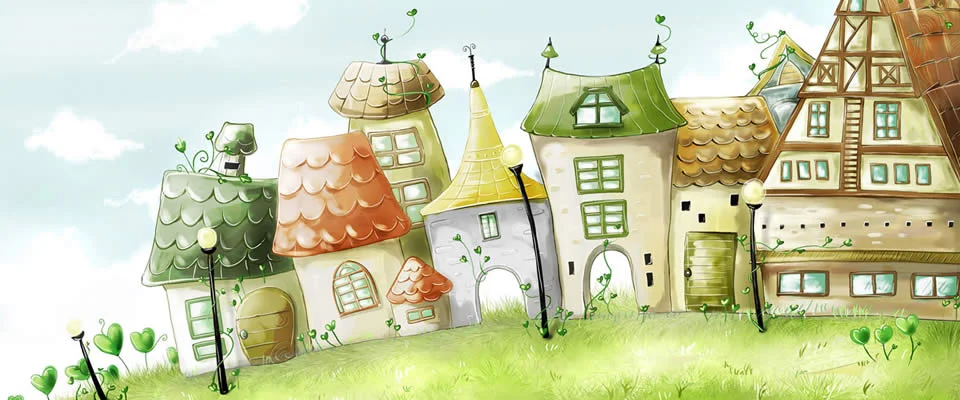
I have a friend named Monty Roberts who owns a horse ranch in San Isidro. He had let me use his horse ranch to put on fund-raising events to raise money for youth at risk programs.
The last time I was there he introduced me by saying, “I want to tell you why I let you use my horse ranch. It all goes back to a story about a young man who was the son of an itinerant horse trainer who would go from stable to stable, race track to race track, farm to farm and ranch to ranch, training horses. As a result, the boy’s high school career was continually interrupted. When he was a senior, he was asked to write a paper about what he wanted to be and do when he grew up.”
“That night he wrote a seven-page paper describing his goal of someday owning a horse ranch. He wrote about his dream in great detail and he even drew a diagram of a 200-acre ranch, showing the location of all the buildings, the stables, and the track. Then he drew a detailed floor plan for a 4,000-square-foot house that would sit on a 200-acre dream ranch.”
He put a great deal of his heart into the project and the next day he handed it into his teacher. Two days later he received his paper back. On the front page was a large red F with a note that read, `See me after class.’
The boy with the dream went to see the teacher after class and asked, `Why did I receive an F?’
The teacher said, `This is an unrealistic dream for a young boy like you. You have no money. You come from an itinerant family. You have no resources. Owning a horse ranch requires a lot of money. You have to buy the land. You have to pay for the original breeding stock and later you’ll have to pay large stud fees. There’s no way you could ever do it.’ Then the teacher added, `If you will rewrite this paper with a more realistic goal, I will reconsider your grade.’
The boy went home and thought about it long and hard. He asked his father what he should do. His father said, `Look, son, you have to make up your own mind on this. However, I think it is a very important decision for you.’ Finally, after sitting with it for a week, the boy turned in the same paper, making no changes at all.
He stated, “You can keep the F and I’ll keep my dream.”
Monty then turned to the assembled group and said, “I tell you this story because you are sitting in my 4,000-square-foot house in the middle of my 200-acre horse ranch. I still have that school paper framed over the fireplace.” He added, “The best part of the story is that two summers ago that same schoolteacher brought 30 kids to camp out on my ranch for a week.” When the teacher was leaving, he said, “Look, Monty, I can tell you this now. When I was your teacher, I was something of a dream stealer. During those years I stole a lot of kids dreams. Fortunately, you had enough gumption not to give up on yours.”
Moral: Don’t let anyone steal your dreams. Follow your heart, no matter what. No Dream is too big or too small when one works hard to live it. One should always try making dreams come true no matter what.
The Dreaming Priest
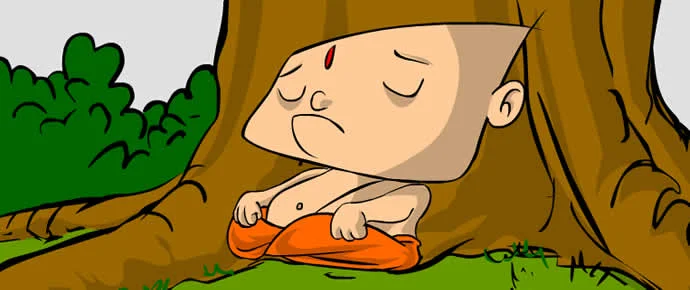
Long time ago there lived a priest who was extremely lazy and poor at the same time. He did not want to do any hard work but used to dream of being rich one day. He got his food by begging for alms. One morning he got a pot of milk as part of the alms. He was extremely delighted and went home with the pot of milk. He boiled the milk, drank some of it and put the remaining milk in a pot. He added slight curds in the pot for converting the milk to curd. He then lay down to sleep.
Soon he started imagining about the pot of curd while he lay asleep. He dreamed that if he could become rich somehow all his miseries would be gone. His thoughts turned to the pot of milk he had set to form curd. He dreamed on; “By morning the pot of milk would set, it would be converted to curd. I would churn the curd and make butter from it. I would heat the butter and make ghee out of it. I will then go to that market and sell that ghee, and make some money. With that money i will buy a hen. The hen will lay may eggs which will hatch and there will be many chicken. These chicken will in turn lay hundreds of eggs and I will soon have a poultry farm of my own.” He kept on imagining.
“I will sell all the hens of my poultry and buy some cows, and open a milk dairy. All the town people will buy milk from me. I will be very rich and soon I shall buy jewels. The king will buy all the jewels from me. I will be so rich that I will be able to marry an exceptionally beautiful girl from a rich family. Soon I will have a handsome son. If he does any mischief I will be very angry and to teach him a lesson, I will hit him with a big stick.”During this dream, he involuntarily picked up the stick next to his bed and thinking that he was beating his son, raised the stick and hit the pot. The pot of milk broke and he awoke from his day dream.
Moral: There is no substitute for hard work. Dreams cannot be fulfilled without hard work.
Two Frogs
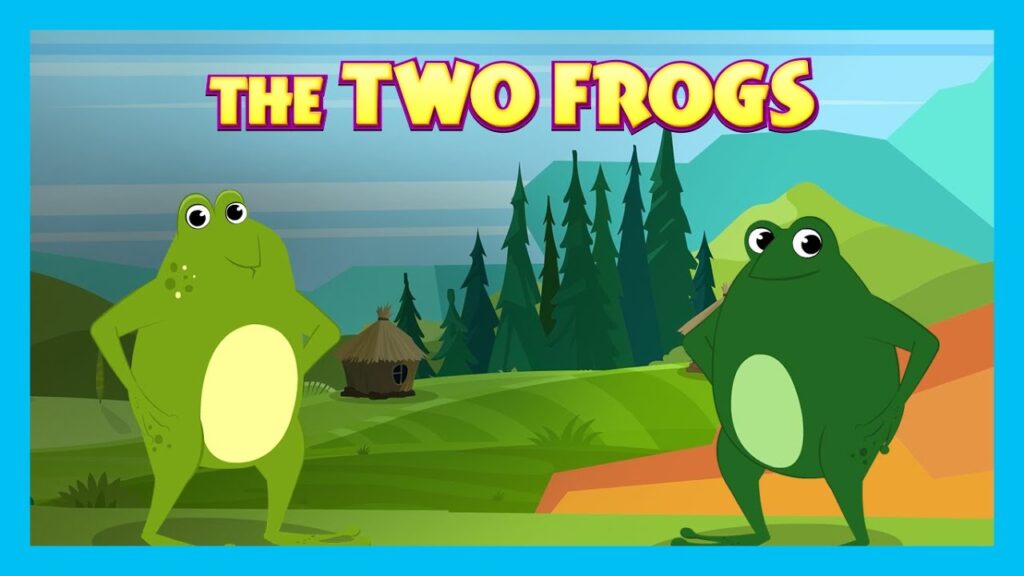
A group of frogs was traveling through the woods and two of them fell into a deep pit. When the other frogs saw how deep the pit was, they told the two frogs that they were as good as dead. The two frogs ignored the comments and tried to jump up out of the pit with all their might. The other frogs kept telling them to stop, that they were as good as dead. Finally, one of the frogs took heed to what the other frogs were saying and gave up. He fell down and died.
The other frog continued to jump as hard as he could. Once again, the crowd of frogs yelled at him to stop the pain and just die. He jumped even harder and finally made it out. When he got out, the other frogs said, “Did you not hear us?” The frog explained to them that he was deaf. He thought they were encouraging him the entire time.
Moral: There is power of life and death in the tongue. An encouraging word to someone who is down can lift them up and help them make it through the day. So be careful of what you say. Speak life to those who cross your path. The power of words… it is sometimes hard to understand that an encouraging word can go such a long way.
Looking at Mirror
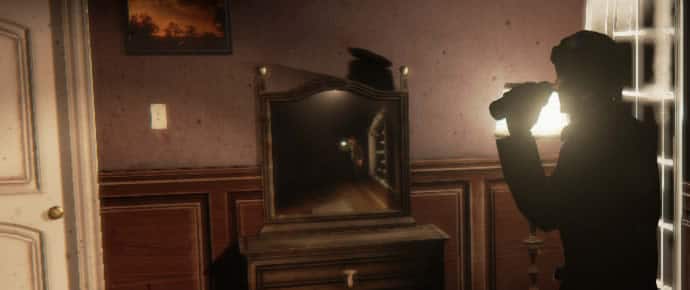
One day all the employees reached the office and they saw a big advice on the door on which it was written: “Yesterday the person who has been hindering your growth in this company passed away. We invite you to join the funeral in the room that has been prepared in the gym”. In the beginning, they all got sad for the death of one of their colleagues, but after a while, they started getting curious to know who was that man who hindered the growth of his colleagues and the company itself.
The excitement in the gym was such that security agents were ordered to control the crowd within the room. The more people reached the coffin, the more the excitement heated up. Everyone thought: “Who is this guy who was hindering my progress? Well, at least he died!” One by one the thrilled employees got closer to the coffin, and when they looked inside they suddenly became speechless. They stood nearby the coffin, shocked and in silence, as if someone had touched the deepest part of their soul. There was a mirror inside the coffin: everyone who looked inside it could see himself.
There was also a sign next to the mirror that said: “There is only one person who is capable of setting limits to your growth: it is YOU.” You are the only person who can revolutionize your life. You are the only person who can influence your happiness, your realization, and your success. You are the only person who can help yourself. Your life does not change when your boss changes, when your friends change, when your partner changes when your company changes. Your life changes when YOU change, when you go beyond your limiting beliefs when you realize that you are the only one responsible for your life. “The most important relationship you can have is the one you have with yourself”.
Moral: The world is like a mirror: it gives back to anyone the reflection of the thoughts in which one has strongly believed. The world and your reality are like mirrors lying in a coffin, which show to any individual the death of his divine capability to imagine and create his happiness and his success. It’s the way you face Life that makes the difference.
Lazy Donkey
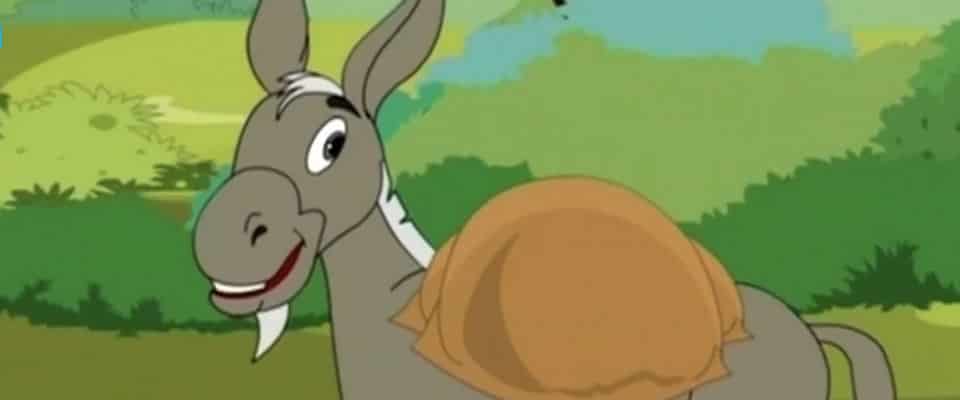
Bhola owns a donkey called Khandya. Bhola is a very tolerant and kind master. The donkey is lazy and is always finding ways to avoid work.
Once upon a time, while returning with sacks of salt on his back, Khandya started crossing a small river stream, but his foot slipped, and he fell in the water. The sacks of salt also got wet and Khandya realized that the fall has lessened the weights of the sacks as the salt has dissolved in the water.
The next few days, while passing through the same path, Khandya intentionally fell into the water. Bhola was unhappy with the way Khandya was behaving because he was losing money in the process. Bhola understood that Khandya was doing this on a purpose. He decided to teach Khandya a lesson.
The next day, instead of salt bags, Bhola loads Khandya with bags of cotton. Khandya is unaware of the change. As per his planned mischief, he falls into the water and gets the bags wet. This made cotton heavy! Khandya is surprised to find the load unbearable and is unable to get up! Bhola let him struggle there for some time as a punishment before helping him get up.
Khandya learns his lesson and starts behaving.
Moral: Work with honesty and sincerity because laziness will ruin you.
The Cracked Pot
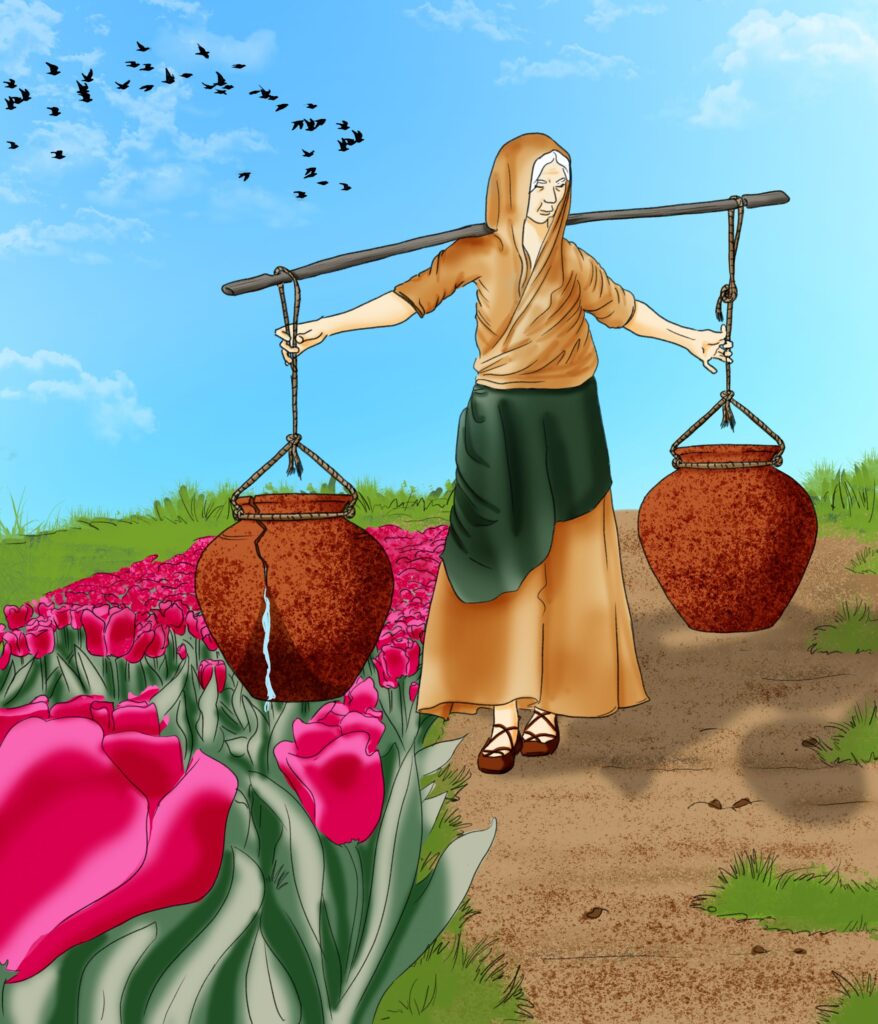
A water bearer in India had two large pots, each hung on each end of a pole which he carried across his neck. One of the pots had a crack in it, and while the other pot was perfect and always delivered a full portion of water at the end of the long walk from the stream to the master’s house, the cracked pot arrived only half full.
For a full two years, this went on daily, with the bearer delivering only one and a half pots full of water in his master’s house. Of course, the perfect pot was proud of its accomplishments, perfect to the end for which it was made. But the poor cracked pot was ashamed of its own imperfection and miserable that it was able to accomplish only half of what it had been made to do.
After two years of what it perceived to be a bitter failure, it spoke to the water bearer one day by the stream. “I am ashamed of myself, and I want to apologize to you”. The bearer asked, “Why? What are you ashamed of?” The Pot replied, “For these past two years I am able to deliver only half of my load because this crack in my side causes water to leak out all the way back to your master’s house. Because of my flaws, you don’t get full value for your efforts”.
The water bearer felt sorry for the old cracked pot, and in his compassion, he said, “As we return to the master’s house, I want you to notice the beautiful flowers along the path.” As they went up the hill, the old cracked pot took notice of the sun warming the beautiful wild flowers on the side of the path, and this cheered it somewhat. But at the end of the trail, it still felt bad because it had leaked out half its load, and so again it apologized to the bearer for its failure.
The bearer said to the pot, “Did you notice that there were flowers only on your side of your path, but not on the other pot’s side? That’s because I have always known about your flaw, and I took advantage of it. I planted flower seeds on your side of the path, and every day while we walk back from the stream, you’ve watered them. For two years I have been able to pick these beautiful flowers to decorate my master’s table. Without you being just the way you are, he would not have this beauty to grace his house.”
Moral: Each of us has our own unique flaws. We’re all cracked pots. In this world, nothing goes to waste. You may think like the cracked pot that you are inefficient or useless in certain areas of your life, but somehow these flaws can turn out to be a blessing in disguise.”
The Ugly Duckling
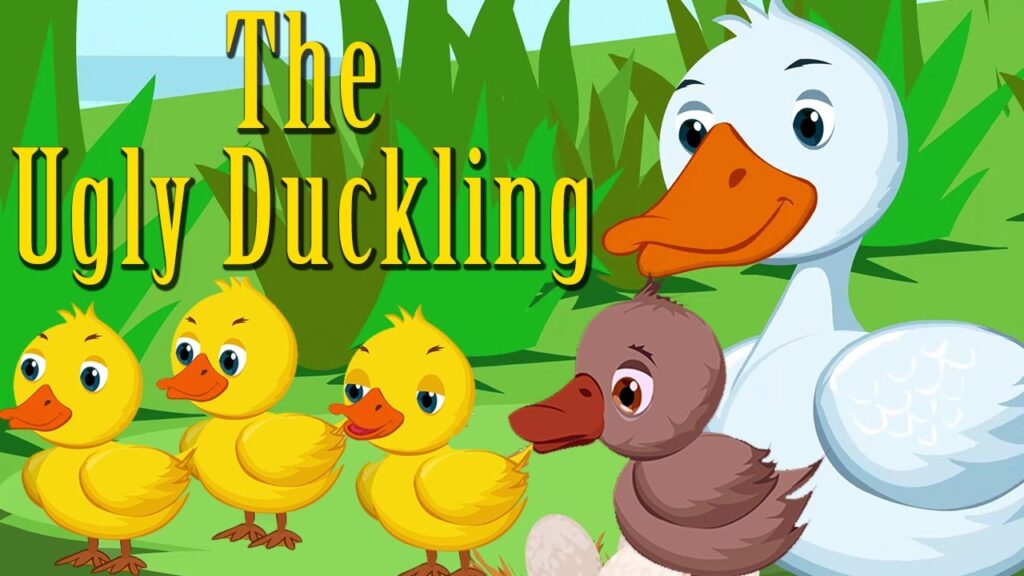
A little duckling was born looking very different from his siblings. The other ducklings called him ugly and made fun of him. Feeling like he didn’t belong, the little duckling ran away and searched for a place where he could be accepted. Seasons passed, and one day, he saw his reflection in a lake. To his surprise, he had grown into a beautiful swan! He wasn’t an ugly duckling at all—he had just been different all along.
Moral of the story: Don’t judge someone by how they look. Everyone is special in their own way, and real beauty is about being yourself.
The Milkmaid and Her Pail
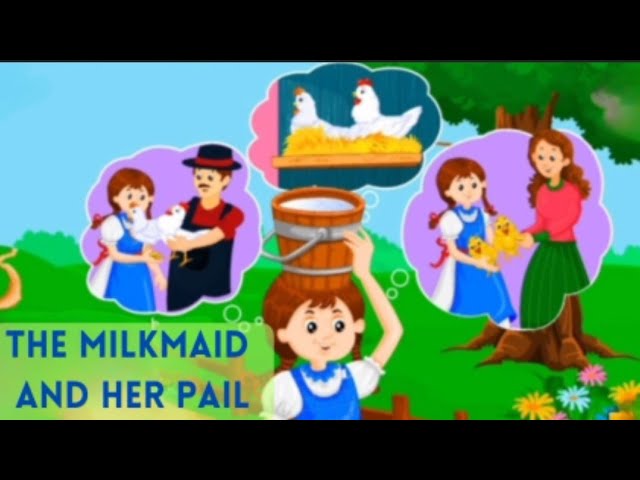
The Milkmaid had just finished milking the cows and was on her way back from the field with the shiny milk pail on her head. She was lost in thoughts about her future plans as she strolled along.
She thought that the milk would give her a good amount of butter to churn. She will sell that and use the money to buy a bunch of eggs for hatching. When May day arrives, she could sell the chickens hatched from eggs and buy a beautiful new dress from the money earned.
Lost in her thoughts, she arrogantly tossed her head, causing the milk pail to tumble to the ground. The milk spilled out, taking with it the butter, eggs, chicks, new dress, and all the milkmaid’s pride.
Moral of the Story: Don’t count your chickens till they’re hatched.
The Wise Old Owl
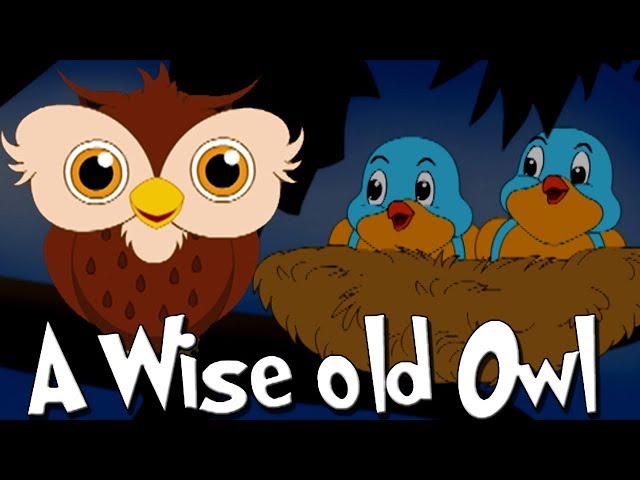
There was an old owl who lived in an oak tree and she saw many things happening around her every day.
One time, the owl saw a boy helping an old man carry a heavy basket.
Another time, the owl saw a little girl yelling at her mother. The old owl saw a lot of things every day, but she never said anything about what she saw.
As time went on, the owl started to talk less and less, but this made her hear better. Now the owl could hear what people were saying as they walked by the trees.
One day, she heard a woman telling someone else that she saw an elephant jumping over her fence. Another day, the owl heard a young man bragging to someone else that he was perfect and never made mistakes in his life.
Every day, the old owl spoke less and listened more. Slowly, she became wiser and was known as the wise owl.
Moral of the Story: Speaking less and listening more makes you wiser.
The Golden Egg
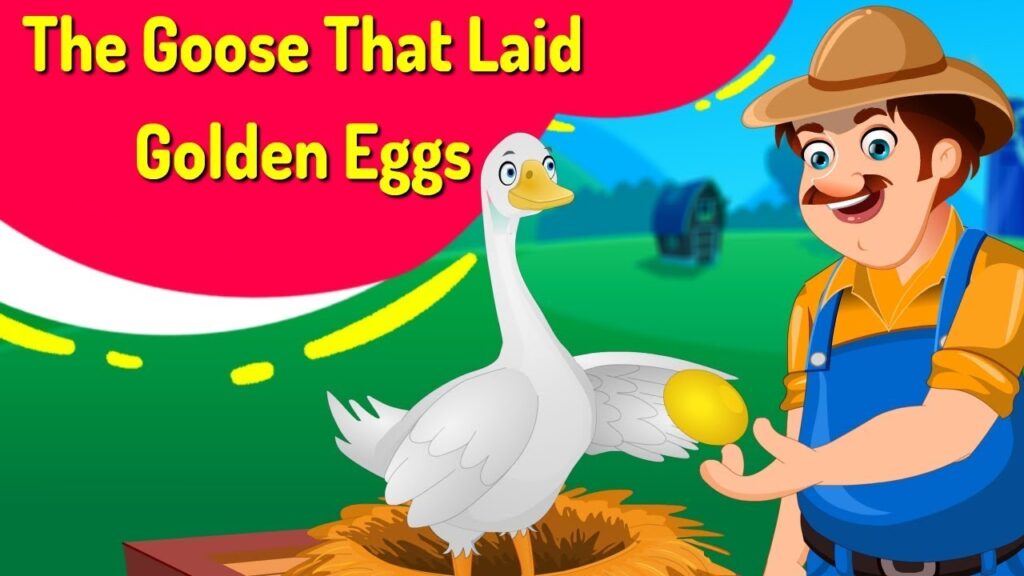
Once upon a time, there lived a cloth merchant in a village with his wife and two children. They were indeed quite well-off. They had a beautiful hen which laid an egg every day. It was not an ordinary egg, rather, a golden egg. But the man was not satisfied with what he used to get daily. He was a get rich-trice kind of a person.
The man wanted to get all the golden eggs from his hen at one single go. So, one day he thought hard and at last clicked upon a plan. He decided to kill the hen and get all the eggs together.
So, the next day when the hen laid a golden egg, the man caught hold of it, took a sharp knife, chopped off its neck and cut its body open. There was nothing but blood all around & no trace of any egg at all. He was highly grieved because now he would not get even one single egg.
His life was going on smoothly with one egg a day but now, he himself made his life miserable. The outcome of his greed was that he started becoming poorer & poorer day by day and ultimately became a pauper. How jinxed and how much foolish he was.
Moral: One who desires more, loses all. One should remain satisfied with what one gets.
The Dreaming Priest
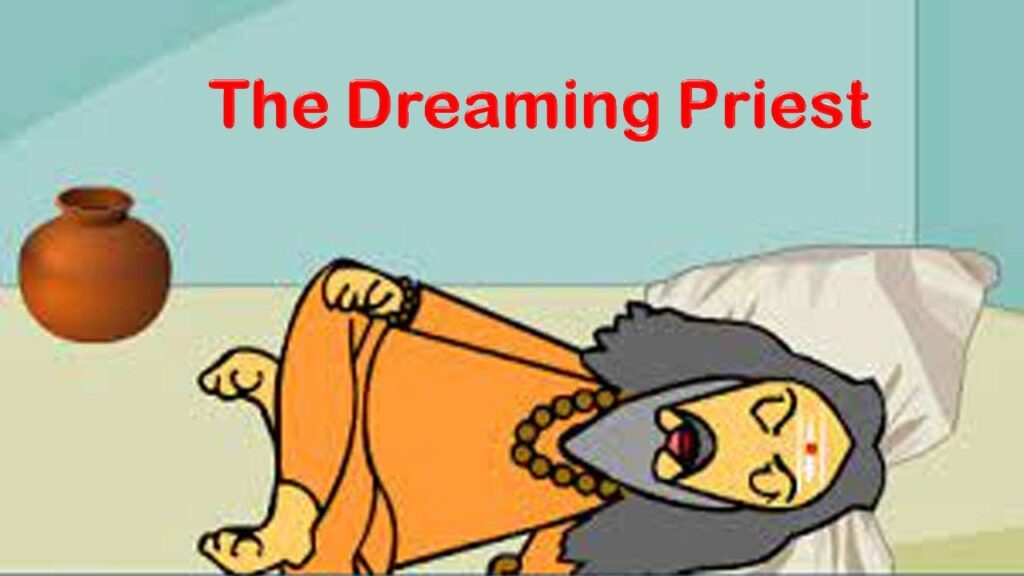
Long time ago there lived a priest who was extremely lazy and poor at the same time. He did not want to do any hard work but used to dream of being rich one day. He got his food by begging for alms. One morning he got a pot of milk as part of the alms. He was extremely delighted and went home with the pot of milk. He boiled the milk, drank some of it and put the remaining milk in a pot. He added slight curds in the pot for converting the milk to curd. He then lay down to sleep.
Soon he started imagining about the pot of curd while he lay asleep. He dreamed that if he could become rich somehow all his miseries would be gone. His thoughts turned to the pot of milk he had set to form curd. He dreamed on; “By morning the pot of milk would set, it would be converted to curd. I would churn the curd and make butter from it. I would heat the butter and make ghee out of it. I will then go to that market and sell that ghee, and make some money. With that money i will buy a hen. The hen will lay may eggs which will hatch and there will be many chicken. These chicken will in turn lay hundreds of eggs and I will soon have a poultry farm of my own.” He kept on imagining.
“I will sell all the hens of my poultry and buy some cows, and open a milk dairy. All the town people will buy milk from me. I will be very rich and soon I shall buy jewels. The king will buy all the jewels from me. I will be so rich that I will be able to marry an exceptionally beautiful girl from a rich family. Soon I will have a handsome son. If he does any mischief I will be very angry and to teach him a lesson, I will hit him with a big stick.”During this dream, he involuntarily picked up the stick next to his bed and thinking that he was beating his son, raised the stick and hit the pot. The pot of milk broke and he awoke from his day dream.
Moral: There is no substitute for hard work. Dreams cannot be fulfilled without hard work.


